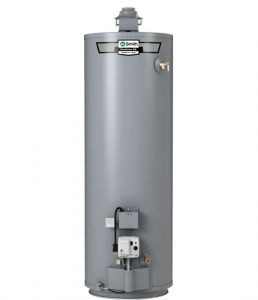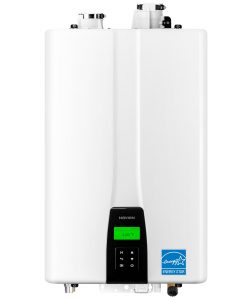Choosing the right water heater for your Barrhaven home is a significant decision that can impact your comfort, energy efficiency, and overall expenses.
The two main options are hot water tanks and tankless water heaters.
To make an informed choice on the best water heater option, it’s essential to understand how each type works, their costs, convenience, longevity, energy efficiency, and hot water supply.
How Do Storage Tank Water Heaters Work?
 A storage tank water heater operates on a relatively straightforward principle. It consists of a large insulated tank, typically made of steel or glass-lined steel, with a heating element at the bottom. Here’s a step-by-step explanation of how it works:
A storage tank water heater operates on a relatively straightforward principle. It consists of a large insulated tank, typically made of steel or glass-lined steel, with a heating element at the bottom. Here’s a step-by-step explanation of how it works:
Cold Water Inlet: When you turn on a hot water tap in your home, cold water from the municipal water supply enters the tank through a dedicated pipe.
Heat Activation: Inside the tank, there is a thermostat that monitors the temperature of the water. If the water temperature drops below the set level, the heating element is activated.
Heating Process: The heating element, powered by either electricity or natural gas water heater unit, begins to heat the water. In an electric water heater, electric coils or elements heat the water. In a gas water heater, a burner heats the water.
Rise in Temperature: As the heating process continues, the temperature of the water in the tank gradually rises.
Temperature Regulation: The thermostat constantly monitors the water temperature. Once it reaches the preset level, the heating element is turned off to prevent overheating.
Maintaining Temperature: The tank is well-insulated to minimize heat loss. This insulation helps in maintaining the temperature of the stored water until it is needed.
Hot Water Outlet: When you turn on a hot water tap, hot water is drawn from the top of the tank through a dedicated hot water pipe. This hot water is replaced by cold water, which enters the tank to be heated again.
Recovery Time: If the hot water in the tank is completely used, there is a recovery time during which the heating element works to bring the new cold water up to the desired temperature.
How Does A Tankless Water Heater Work?
A tankless water heater, also known as an on-demand water heater, operates on a different principle compared to a storage tank heater. Here’s how it works:
Cold Water Inlet: When a hot water tap is turned on, cold water from the municipal supply enters the tankless unit through a dedicated pipe.
Flow Sensor Activation: The flow sensor inside the tankless unit detects the water flow and triggers the heating process.
Heat Activation: Depending on the type (gas or electric), a gas burner or electric element is activated to heat the water as it flows through a heat exchanger.
Rapid Heating: The heat exchanger quickly raises the temperature of the water as it passes through. This process happens in real-time, providing hot water on-demand.
No Storage: Unlike a storage tank, a tankless unit does not store heated water. It only heats water as it is needed, which is why it’s often referred to as an “on-demand” water heater.
Continuous Supply: As long as there is a demand for hot water, the tankless unit continues to heat water on-demand. There is no need to wait for a tank to refill or reheat.
Flow Rate Limits: Each tankless unit has a maximum flow rate, which determines how much hot water it can deliver per minute. If the demand exceeds the unit’s capacity, the water may come out cooler than desired.
Energy Efficiency: Tankless water heaters are highly energy-efficient because they do not experience standby heat loss, which is common in storage tank heaters. They only consume energy when hot water is needed.
Safety Features: Tankless units often have safety features such as temperature controls and pressure relief valves to ensure safe operation.
In summary, a tankless water heater provides hot water on-demand, without the need for a storage tank. It offers continuous hot water, making it a popular choice for households with high hot water demands. Additionally, tankless units are known for their energy efficiency and space-saving design.
Which Is Better – Tankless Or Storage Tank Water Heaters?
Cost
Hot Water Tanks:
Upfront costs of hot water tanks have a distinct advantage. They are generally more affordable to purchase and install, especially if you are replacing a unit of the same size. Additionally, the installation process is typically less complex, which can contribute to lower labor costs.
Tankless Water Heaters:
In contrast, the best tankless water heaters tend to have a higher initial cost. This is due to the advanced technology and engineering involved in their design. Moreover, the installation of a tankless system may necessitate additional expenses, such as upgrading the gas pipe or electrical panel to accommodate the increased demand.
Consideration: While hot water tanks are more budget-friendly initially, it’s important to weigh this against the long-term benefits of a tankless system, including lower energy bills and extended lifespan. Water heater renting can also be an option.
Convenience
Hot Water Tanks:
Hot water tanks provide a reservoir of hot water that can be used at any time. This means that multiple hot water fixtures can be used simultaneously without a decrease in temperature. However, once the capacity of the tank is depleted, there is a recovery time during which the tank must reheat the water before it is available again.
Tankless Water Heaters:
Tankless water heaters offer the advantage of a continuous and uninterrupted supply of hot water. They heat water on-demand, ensuring that hot water is available as soon as a faucet is turned on. This means you won’t run out of hot water, no matter how much you use.
Consideration: Tankless water heaters provide a convenience advantage, particularly for larger households or those with high hot water demands.
Longevity
Hot Water Tanks:
Hot water tanks typically have a lifespan of about 10-12 years. With regular maintenance, such as flushing out mineral buildup and inspecting components like the pressure relief valve and heating element, their lifespan can be extended.
Tankless Water Heaters:
Tankless water heaters tend to have a significantly longer lifespan, often lasting up to 20 years or more. Regular maintenance, including flushing to remove mineral buildup, is essential for ensuring their longevity.
Consideration: The longer lifespan of tankless water heaters can result in cost savings over time, as they may not need to be replaced as frequently as hot water tanks. Learn about how to determine the age of your water heater.
Energy Efficiency
Hot Water Tanks:
Hot water tanks have a notable drawback in terms of energy efficiency, known as standby heat loss. This refers to the energy wasted in maintaining stored water at a high temperature even when it is not being used. This can contribute to higher energy bills.
Tankless Water Heaters:
Tankless water heaters are highly energy-efficient because they do not suffer from standby heat loss. They heat water only when it is needed, providing significant energy savings over time.
Consideration: The energy efficiency of tankless water heaters can lead to lower energy bills and a reduced environmental impact.
Hot Water Supply
Hot Water Tanks:
Hot water tanks have a limited capacity, and once it is depleted, you will need to wait for the tank to fully heat up again. The recovery time for gas tanks is about 30-40 minutes, and for electric tanks, it is approximately twice as long.
Tankless Water Heaters:
Tankless water heaters provide a constant supply of hot water. However, it’s important to note that their capacity is not unlimited. Depending on the specific model, they can heat about 7.5-20 litres of water per minute.
Consideration: Tankless water heaters offer the advantage of a continuous supply of hot water, which can be particularly beneficial for larger households or those with high hot water demands.
Sizing
Hot Water Tanks:
Hot water tanks are available in various sizes, allowing you to choose one that matches the requirements of your family. This ensures that you have enough hot water to meet your household’s needs.
Tankless Water Heaters:
Tankless water heaters are often more suitable for smaller households or homes with lower hot water demands. They may not have the capacity to supply hot water for the entire house, especially in regions where electric tankless heaters are more common.
Consideration: Proper sizing is crucial to ensure that your chosen water heater can meet the hot water demands of your household effectively.
Environmental Footprint
Hot Water Tanks:
Hot water tanks have a larger environmental footprint due to their standby heat loss, which leads to higher energy consumption. This can result in increased greenhouse gas emissions.
Tankless Water Heaters:
Tankless water heaters are more environmentally friendly due to their higher energy efficiency and reduced standby heat loss. This leads to lower energy consumption and a reduced environmental impact.
Consideration: Opting for a tankless water heater can contribute to a greener and more sustainable home.
In conclusion, the choice between a tankless water heater and a storage tank water heater depends on your specific needs, preferences, and budget. Considering factors such as upfront costs, convenience, longevity, and environmental impact will help you make an informed decision that aligns with your priorities for your Ottawa home. Consulting with the Hot Water Ottawa experts can also provide valuable insights and guidance in making the best hot water heater choice for your household.
Talk To The Ottawa Water Heater Experts
Before making your final decision, consult with experts at Hot Water Ottawa. They can provide valuable insights into the pros and cons of both hot water tanks and tankless systems, helping you make an informed choice.
Once you’ve made your decision, their experienced team can handle the professional installation of your chosen water heater, ensuring you enjoy efficient and reliable hot water in your Ottawa home.
If renting a water heater aligns with your preferences, they offer affordable rental options as well.

